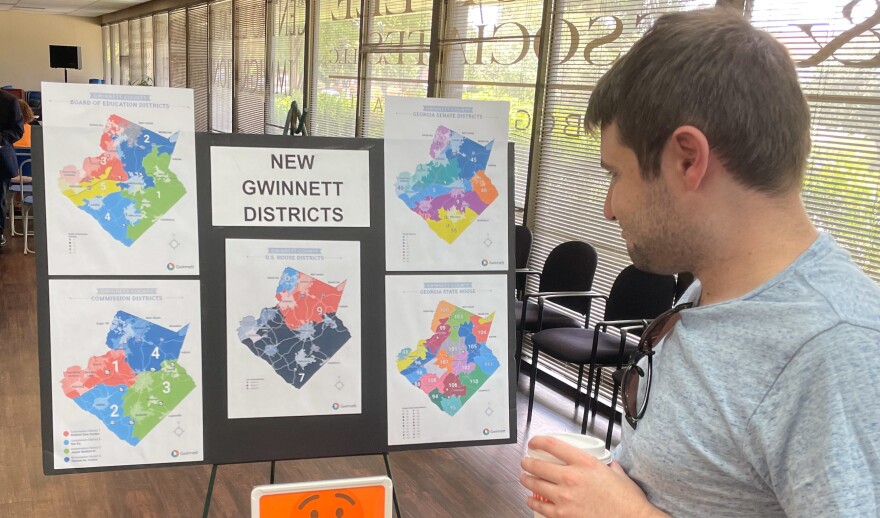Updated May 23, 2022 at 11:59 AM ET
NORCROSS, Ga. — The sign-in table at May's meeting of the Gwinnett County Democrats is covered in literature.
There are sheets listing early voting locations, stacks of glossy campaign flyers and colorful maps of the new congressional districts in suburban Atlanta.
These new maps have Democrats like Catherine Valyi facing a difficult choice.
"We're talking about strong, intelligent, powerful ladies," she says.
Valyi is talking about the three women running in a contentious Democratic primary on Tuesday to represent this district in Congress.
Two of them, Carolyn Bourdeaux and Lucy McBath — who Valyi is leaning toward — are incumbent members of Congress. They are now running against each other due to redistricting.
Whoever wins will glide to Washington in November in this safe Democratic district.
Across the country, safe districts like this one are becoming the norm.
Competitive districts that swing between Republicans and Democrats get a lot of attention, but they are rare and their numbers are shrinking. This last round of redistricting wiped out a slew of them, setting up heated primaries and then sleepy races come November.
Just a few years ago, Atlanta's suburbs were congressional battlegrounds. In 2020, policy professor Bourdeaux defeated a Republican. In the district next door, prominent gun control advocate McBath did the same in 2018.
But when Republican lawmakers redrew the maps last year, they made McBath's 6th Congressional District a lot more friendly to Republicans by squeezing as many Democrats as possible into the 7th District, which is represented by Bourdeaux.
Two competitive districts became one very red district and one very blue district.
McBath chose to challenge Bourdeaux for the safely blue seat.
"She made her choice and we just have to go with it," says Laura Raymond, who's voting for Bourdeaux and is working the sign-in table.
Raymond thinks McBath could have mounted a competitive race in her original district, rather than taking on Bourdeaux.
"I have found more Democrats who thought they were the only ones in their neighborhood and they're not," Raymond says.
Just a few swing districts remain
Only a few dozen of the 435 congressional seats are considered competitive in 2022.
"It's really stunning," says Richard Pildes, a law professor at New York University who has extensively studied the demise of swing districts. "The decimation of competitive districts in this round of redistricting makes me concerned that Congress is going to become even more dysfunctional."
Safe seats leave voters in the middle, who like having a choice of candidates in November, without much say.
"We know that when members are in safe seats, they have no fear of losing the general election, so all they care about is making sure they win their primaries," Pildes says. "And the way to ensure you're going to win a primary is to move to the most extreme sides of the spectrum."
Brenda Lopez, who chairs the Gwinnett County Democrats, says she's seen this up close.

As a former state legislator, Lopez observed how the proliferation of safe districts undercut lawmakers' ability to work across the aisle. She says she heard that sentiment in conversations with Republican colleagues all the time.
"And the answer would be, 'You're right. This is a bad policy, a bad law, but I have to vote for it.' Otherwise, they risk challenges in the primary," Lopez says.
In most states, the party in power has the final say on redistricting maps and they deploy that power to maximize their partisan advantage.
Lopez supports the idea of an independent redistricting commission, which a handful of states have adopted with the aim of drawing fairer seats.
In Georgia, Republicans control the statehouse and the governor's office. And they control the mapmaking.
Ryan McLaughlin, who's helping pack up after the meeting, says it's frustrating that redistricting will likely result in one less Democrat from Georgia in Congress, just as they're building political power in the state.
But McLaughlin says he doesn't think drawing competitive districts just for the sake of bipartisanship makes sense either.
"We can get into that trap of, it's got to be bipartisan," he says. "I mean, every once in a while, fine, but we just tried to codify Roe v. Wade after some pearl clutching, all those Republicans voted against it."
McLaughlin is voting for Donna McLeod, the Democratic state representative also running for this seat. If no candidate notches more than 50% of the vote, the top two candidates will compete in a runoff election in June.
"Everything is so charged right now"
The district McBath is leaving to challenge Bourdeaux, the 6th, stretches north from the city of Atlanta.
It's home to Jeanna Kelley, who moved to this area a few years ago from a very conservative part of Georgia. Kelley was excited to live in a politically dynamic district, where Democrats were starting to have enough clout to sway elections.
"In Georgia, I haven't had much opportunity very often to feel like I'm ideologically aligned with a candidate who's poised to represent me," Kelley says.

But with redistricting, this stretch of rapidly growing suburbia has been drawn into a district now poised to easily elect a Republican. The top candidates are all pushing false claims about election fraud in 2020.
Kelley worries that safe districts elevate candidates who only reinforce the most extreme views of their voters.
"Everything is so charged right now in our current political climate and it's only getting worse," she says.
But Kelley is not deterred and says she's going to keep volunteering. She hopes that one day her district will become competitive again, giving her a shot to elect a candidate she's proud of.
Copyright 2022 90.1 WABE







